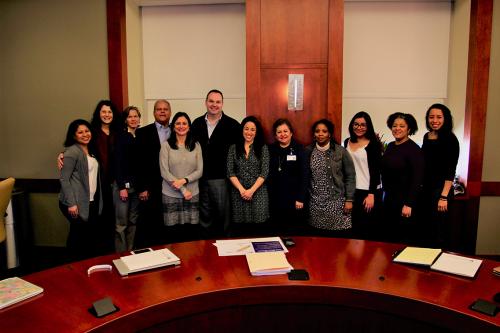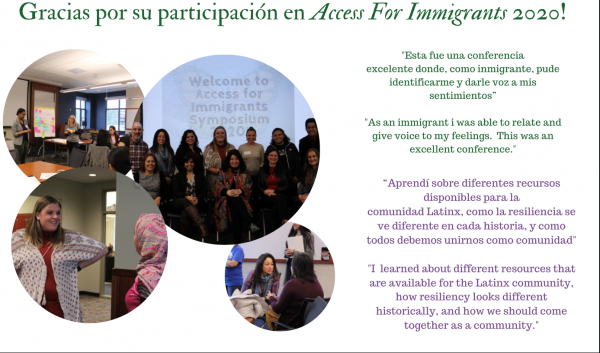Access for Immigrants | Acceso para Inmigrantes:
Past Symposiums
On February 1, 2020, we hosted our third annual symposium with the theme "Affirming Communities, Cultivating Resilience." Like in the past, we continued to increase awareness of services available for immigrants and refugees in the Triangle area and the capacity of providers in caring for this population. This symposium had a special emphasis on Latino youth.
On January 22, 2019, we hosted our second annual symposium of Access for Immigrants. The symposium aimed to identify gaps in current care/research practices as it relates to immigrants and refugees; discuss immigrant and refugee access to social and health services in the Triangle; and critique current immigration and health policy and its impact on the health and wellbeing on immigrants and refugees.
View the program from Access For Immigrants 2019.
In June 2018, we held our first symposium called "Access for Immigrants" at Duke University School of Nursing. Students, faculty, staff and community members from across the Triangle gathered to discuss what resources are available for the immigrant/refugee community. The goal of this symposium was to increase capacity among researchers and practitioners to address issues related to the mental health and legal rights of immigrants and refugees.
For More Information, contact Maralis Mercao Emerson.
Simposios Pasados
El 1 de febrero de 2020 organizamos nuestro tercer simposio anual con el tema "Afirmando comunidades, cultivando la resiliencia". Como en el pasado, continuamos aumentando la conciencia sobre los servicios disponibles para inmigrantes y refugiados en el área del Triángulo y la capacidad de los proveedores para atender a esta población. Este simposio tuvo especial énfasis en la juventud latina.
El 22 de enero de 2019 organizamos nuestro segundo simposio anual de Acceso para Inmigrantes. El simposio tuvo como objetivo identificar brechas en las prácticas actuales de atención/investigación en relación con inmigrantes y refugiados; discutir el acceso de inmigrantes y refugiados a los servicios sociales y de salud en el Triángulo; y criticar la actual política de inmigración y salud y su impacto en la salud y el bienestar de inmigrantes y refugiados.
Vea el programa de Acceso Para Inmigrantes 2019.
En junio de 2018, realizamos nuestro primer simposio llamado "Acceso para inmigrantes" en la Escuela de Enfermería de la Universidad de Duke. Estudiantes, profesores, personal y miembros de la comunidad de todo el Triángulo se reunieron para discutir qué recursos están disponibles para la comunidad de inmigrantes/refugiados. El objetivo de este simposio fue aumentar la capacidad entre investigadores y profesionales para abordar cuestiones relacionadas con la salud mental y los derechos legales de inmigrantes y refugiados.
Para obtener más información, comuníquese con Maralis Mercao Emerson.
SER Hispano Project:
The SER (Salud, Estrés y Resiliencia/Health, Stress and Resilience) Hispano Project is a research study funded by the National Institute on Minority Health and Health Disparities (R01MD012249, PI: Gonzalez-Guarda, R.M.) studying the effects of acculturation stress and resilience on the health and wellbeing of Latino immigrants in the research triangle area.

Why?
Hispanic/Latino immigrants to the U.S. are healthier than the general population upon arrival, but their health significantly declines over time (Antecol & Bedard, 2006; Cho et al., 2006; Lee et al., 2013). This decline in health appears to be influenced by acculturation related processes, but little is known about the influence of the stress associated with this phenomenon - acculturation stress. Little is known how individual, family, and community resilience among Latinos(x) buffers against this stress and influences both psychological and physical health. We hope to gain new knowledge to inform interventions that improve the health of Latino(x) immigrants and capitalize on their strengths.
Approach
We value community based participatory approaches that engage individuals in the community and organizations as equal partners in the research. Our team is a collaboration between Duke University and community organizations within the Triangle. Most recently, the SER Hispano Project works with El Centro Hispano of Durham and El Futuro.
References
Antecol, H., & Bedard, K. (2006). Unhealthy assimilation: Why do immigrants converge to American health status levels? Demography, 43(2), 337-360.doi: 10.1353/dem.2006.0011
Cho, Y., Frisbie, W. P., Hummer, R. A., & Rogers, R. G. (2006). Nativity, duration of residence, and the health of Hispanic adults in the United States. International Migration Review, 38(1), 184–211. doi:10.1111/j.1747-7379.2004.tb00193
Lee, S., O’Neill, A. H., Ihara, E. S., & Chae, D. H. (2013). Change in self-reported health status among immigrants in the United States: associations with measures of acculturation. PloS one, 8(10), e76494.
El proyecto SER Hispano (Salud, Estrés y Resiliencia) es un estudio de investigación financiado por el Instituto Nacional de Disparidades de Salud y Salud de las Minorías (R01MD012249, IP: Gonzalez-Guarda, R.M.) que estudia los efectos del estrés por aculturación y la resiliencia en la salud y el bienestar de los inmigrantes Latinos en el área del Triángulo de Carolina del Norte

¿Por qué?
Inmigrantes hispanos/latinos a los Estados Unidos son más saludables que la población general al momento de llegar (a su llegada) pero su salud se deteriora significativamente con el tiempo (Antecol & Bedard, 2006; Cho et al., 2006; Lee et al., 2013). Este deterioro en la salud parece estar influenciada por procesos relacionados con la aculturación, pero poco se sabe acerca de la influencia que tiene el estrés asociado con este fenómeno- estrés por aculturación.
Se sabe muy poco en como la resiliencia individual, familiar y comunitaria entre los latinos amortigua este estrés e influencia tanto la salud física como psicológica.
Esperamos obtener nuevos conocimientos para informar a intervenciones que mejoren la salud de los inmigrantes latinos y capitalicen en sus fortalezas
ENFOQUE
Nosotros valoramos el enfoque participativo comunitario que involucra a los individuos y a las organizaciones comunitarias como socios iguales en la investigación. Nuestro equipo es una colaboración/alianza entre la Universidad de Duke y organizaciones comunitarias del Triángulo. Más recientemente, el proyecto SER Hispano trabaja con el Centro Hispano y El Futuro.
Referencias
Antecol, H., & Bedard, K. (2006). Unhealthy assimilation: Why do immigrants converge to American health status levels? Demography, 43(2), 337-360.doi: 10.1353/dem.2006.0011
Cho, Y., Frisbie, W. P., Hummer, R. A., & Rogers, R. G. (2006). Nativity, duration of residence, and the health of Hispanic adults in the United States. International Migration Review, 38(1), 184–211. doi:10.1111/j.1747-7379.2004.tb00193
Lee, S., O’Neill, A. H., Ihara, E. S., & Chae, D. H. (2013). Change in self-reported health status among immigrants in the United States: associations with measures of acculturation. PloS one, 8(10), e76494.
Published Resaerch Papaers:
- Acculturation Stress, Age at Immigration, and Employment Status as Predictors of Sleep Among Latinx Immigrants
- Documentation Status and Self-Rated Physical Health Among Latinx Young Adult Immigrants: the Mediating Roles of Immigration and Healthcare Stress
- The Influence of Peer Relationships on Latina Adolescents' Experiences with Depressive Symptoms
- A Systematic Review of Physical Health Consequences and Acculturation Stress Among Latinx Individuals in the United States
- Cultural and linguistic adaptation of psychosocial measurements for latinx participants-Leveraging community-engaged research methods
- Targeted Strategies for Recruitment and Engagement of Latinx Immigrants in Longitudinal Biobehavioral Research
- Age of Immigration and Depressive Symptoms Among Young Adult Latinx Immigrants: A Test of Explanatory Models
- Acculturation, Acculturative Stress, Adverse Childhood Experiences, and Intimate Partner Violence Among Latinx Immigrants in the US
- Promoting Health Equity in the Latinx Community, Locally and Globally: The Duke University School of Nursing Model
- Acculturative Stress, Resilience, and a Syndemic Factor Among Latinx Immigrants
- Determining the role of acculturative stress in predicting mental health service use among Latinx immigrants
- Dexmedetomidine provides type-specific tumour suppression without tumour-enhancing effects in syngeneic murine models
